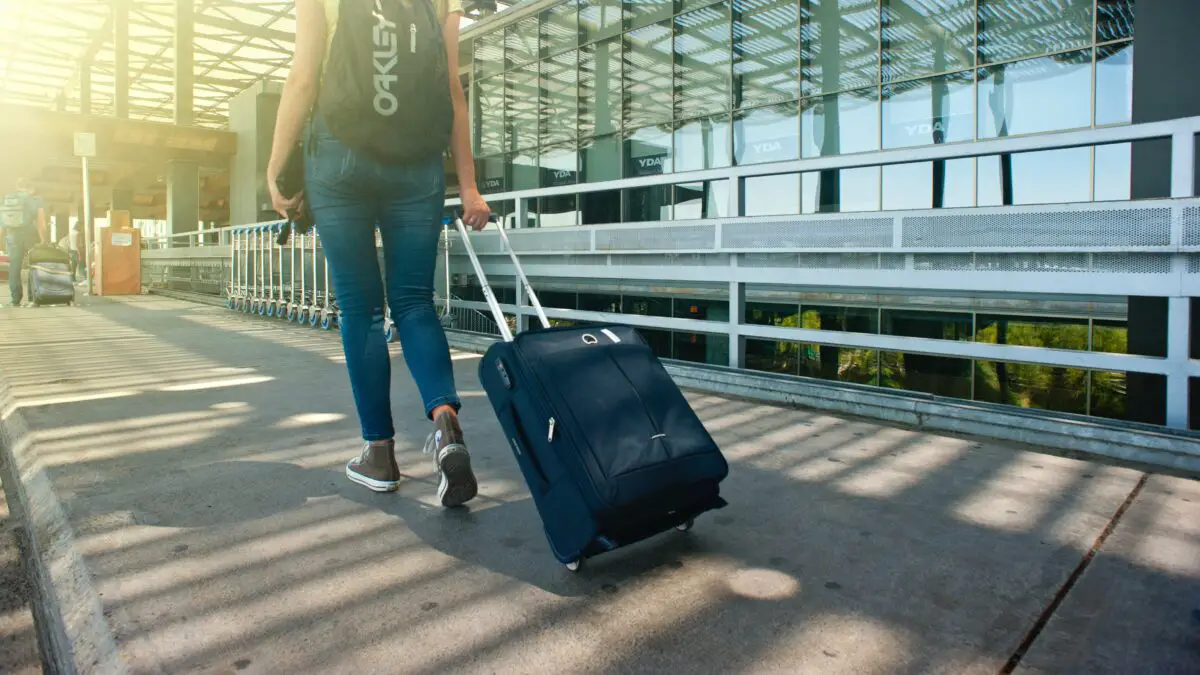Are you in the mood for an adventure? Before you pack your bags and grab your passport, make sure you have the right vocabulary to talk about it.
These English travel idioms will not only inspire you to see the world but can also be used on your journey. We have included lots of fun and useful expressions about travel and transport, all with examples and definitions. Idioms can be hard to understand, after all.

Travel idioms
A country mile
A country mile is not an exact measurement but refers to a deceptively long distance. Country roads usually meander, so a destination a mile away can take much more than a mile to reach.
“It was suposed to be a 5 mile run but it felt like 5 country miles!”
Itchy feet
People who have itchy feet are bored of where they are and have a desire to travel, do something new, or explore.
“She only came back from her camping trip last week but she got itchy feet and is setting off on a road trip tomorrow.’
Feet and other body parts are featured in idioms a lot, so they are always useful to know.
The travel bug
Be careful: if you catch the travel bug, it may turn your plans upside down! The travel bug refers to a strong urge, passion or desire to travel the world.
“I caught the travel bug when I first explored Europe over 20 years ago.”
At a crossroads / a fork in the road
You will surely come across a crossroads or a fork in the road when you are traveling. These expressions relate to any place where the road splits or meets another road, and you must decide which way to go.
However, we have put these on our list of travel idioms because they can also be used figuratively as choice idioms. You can say someone is at a crossroads or at a fork in the road if they have an important decision to make in any area of their life.
“I’m at a bit of a crossroads and I’m not sure what I should do.”
“We get along fine, until we hit a fork in the road.”
At the crack of dawn
At the crack of dawn is a simple but fun way of describing any time very early in the morning.
“We’re going to have to get up at the crack of dawn to make our flight.”
There are many other time idioms you may find useful for planning a travel itinerary.
Bad news travels fast
Bad news travels fast, or at least that is how it often seems. Most bad news is scandalous or a great topic for gossip, so people are more likely to talk about it with their friends or colleagues.
“I can’t believe I got fired and that my wife knew about it before I even got home. I guess bad news really does travel fast!”
Live out of a suitcase
People who live out of a suitcase travel a lot from place to place, not returning home often. Since they normally stay for a short period of time in each place, they keep all their clothes in their suitcase rather than bothering to unpack and settle in.
“Guys, we have a busy interary, so get ready to live out of your suitcases for the next week or so!”
On a shoestring
Although this is a good travel idiom, it can actually apply to all situations. Anything that happens on a shoestring is done with a very small budget, keeping costs as low as possible.
“I’m backpacking around Asia next year but I’m traveling on a shoestring.”
Find some more money-related idioms here.
Hit a roadblock
This is a saying with two meanings. An actual roadblock is something used by the police to stop the illegal activity of a driver. As a travel-related idiom, to hit a roadblock refers to something getting in the way and stopping you from making progress in a project.
“The new contract negotiations were going well but we’ve hit a bit of a roadblock now.”
This is not to be confused with the one below.
Hit the road
Here’s a very popular travel idiom; so popular, in fact, that you’ll hear it in many songs like “Hit the Road Jack“. To hit the road simply means to depart on a journey.
“Well, it’s getting late, so I think it’s time we hit the road.”
“The car is all packed; let’s hit the road!”
You normally say this phrase when referring to traveling by car or going home, but it could be used in other circumstances.
Catch the sun
A lot of these travel idioms focus on going on vacation. For most people, a vacation means time in the sun. To catch the sun is to spend enough time in the sun that your skin burns or develops a tan.
“Won’t be long until I’m catching the sun in Spain.”
“Looks like you have caught the sun today.”
You may also hear catch some rays, which means to sunbathe.
If you’re heading off for a summer vacation, make sure you check out some idioms about summer before you go. There are expressions to suit every season, in fact: winter, fall (autumn) and spring.
Pack light / travel light
People who travel light or pack light are careful not to bring unnecessary items. They keep their luggage to a minimum, whether for convenience or to avoid paying extra airfares for it.
“I always travel light.”
“Much as I try to travel light, I always seem to need a huge suitcase.”
Travel on a full / empty stomach
Part of the joy of traveling is deciding what to eat! To travel on a full stomach means you have just eaten a lot and have no room for any more food. On the other hand, an empty stomach means you are very hungry as there is no food in you!
“I can’t have you traveling on an empty stomach. Let me make you a snack.”
“I mustn’t travel on a full stomach. I get car sick.”
A mile a minute
Travel idioms can be a fun way to exaggerate your point. When you need to highlight that someone was traveling very fast, you could say they were moving a mile a minute. This saying comes from when cars had a top speed of 60 miles per hour and it was considered very fast.
“You must have gone a mile a minute to get here so fast!”
This fast idiom can also be used more generally to refer to anything done very quickly.
“She had the whole family to cook for and was chopping and mixing a mile a minute to get it all done!”
“I could tell he was excited because he was talking a mile a minute. I couldn’t keep up.”
Off the beaten track / path
A beaten path or track is one that is well-used by other people. So, to get off the beaten track is to go somewhere unknown or more isolated.
“When we visit Thailand we like to get off the beaten track so we’re not just following the other tourists!”
Although it may seem similar to the next expression, this saying is more about a physical place than a direction in life.
Take the road less traveled
Here’s a travel idiom that may just change your life!
When you have a choice to make, people may advise you to take the road (or path) less traveled. This is an encouragement to think independently or unconventionally, rather than conforming to the norm and picking the option that everyone else would pick.
“I’ve decided to take the path less travelled and decline the job offer.”
Just to be very clear: this doesn’t have to be a decision related to travel. It could be about the type of job you choose, family options, education path, etc.
If you enjoy an adventure like this, also check out some action and adventure idioms.
Travel broadens the mind
Here is a little proverb that’s sneaked onto our list of travel idioms. A great reason people may give for seeing the world is that travel broadens the mind. You learn about different cultures, beliefs, and customs. You learn first-hand about history and taste new foods. Travel gives you a greater understanding and a new perspective on life.
“I’m so glad you’re taking a year to backpack Africa. Travel really broadens the mind.”
Spread your wings and fly/soar
Here is another travel expression that describes the freedom and liberty that comes with being able to wherever you like. We can liken this feeling to a bird spreading its wings to fly or soar above the world.
“You’re still young! It’s the best time to spread your wings and fly.”
This expression about freedom can relate to things other than travel, such as moving to a new place or beginning a new season of life.

Travel idioms featuring different modes of transport
We’re not done yet! Here are some more travel idioms, this time featuring or about different modes of transport.
In the driver’s seat
The person in charge of a situation and making the choices is the person in the driver’s seat.
“Mary took the week off, so Sam is in the driver’s seat.”
If you specifically need driving-related idioms more than travel idioms, there are plenty to refer to.
Catch a red-eye
Due to the size of America, it’s common to have long domestic flights. This is why this phrase is more of an American English idiom than British. A red-eye is a flight that departs late at night and/or arrives early in the morning, disrupting your natural sleep pattern and perhaps giving you red or bloodshot eyes.
“To make it to the wedding on time, we’ll have to catch the red-eye tomorrow.”
In the same boat
Normally, you’d use this saying in the context of a negative situation. To be in the same boat means that you and the people around you are all in a similar situation or experiencing the same thing.
“I know you’re cold, but we’re all in the same boat.”
“The recent tax increases have hit us hard, but everyone is in the same boat.”
Here are some more idioms to use in bad situations.
Fly under the radar
Radars are used to detect things like planes or submarines. Someone or something that flies under the radar goes unnoticed or undetected, usually by people in authority.
“Let’s keep our heads down and hope we fly under the radar.”
As the crow flies
The straight-line distance from one location to another is measured as the crow flies. This is different from the distance needed to actually travel from one place to the other, since you usually need to navigate around roads, buildings, rivers, and other geographical features.
“The beach is only 2 miles away as the crow flies, but it’s more like 4 on the winding country roads.”
Find some more interesting bird idioms here.
Don’t forget to write
If you’re going to be traveling for a while, you’ll probably want to write to your friends and family back home. Traditionally this was done via letters or postcards, but now you’re more likely to email or use social media.
You can say don’t forget to write as a farewell, reminding the person to keep in touch while they are away.
“Have a fantastic trip, and don’t forget to write!”
It’s surprising how many idioms about writing are becoming obsolete as we turn to electronic methods of communication.
Float your boat
If you find something appealing, you can say that it floats your boat. It’s often used in negative constructions about things you don’t like.
“I think I’ll pass on the spring rolls, thanks. They don’t really float my boat.”
You can also use the expression whatever floats your boat to mean ‘whatever you like’ or ‘whatever makes you happy’.
“Listen, whatever floats your boat is ok by me.”
“Peanut butter and tomato sandwiches sound a bit weird to me, but… whatever floats your boat.”
Occasionally, you may hear people use this in relation to a person, meaning that they find that person attractive. This could be considered rather sleazy, and there are better idioms about love and attraction that you could use.
Just the ticket
Here’s a travel idiom that can actually be used as a sentence on its own. Just the ticket is a way of expressing that something is exactly what is needed or wanted; a perfect solution to a problem.
“Brilliant! That’s just the ticket. Thanks.”
Be aware that this expression might sound a little old-fashioned nowadays. Find some other ways to describe good things here.
Jump ship
There really are plenty of boat and ship-related travel idioms. When you jump ship you move from one group, cause, or situation to join another.
“We heard the company was struggling, so Martha jumped ship as soon as she could.”
That ship has sailed
Sadly, when you hear the saying that ship has sailed, it means you’ve missed an opportunity. Perhaps something or someone is no longer available, or the situation has changed.
“Sorry son, that ship has sailed.”
Here are some more idioms about change that you can use.
Train of thought
If you didn’t know the meaning of the phrase train of thought, you’d struggle to work it out or make a logical guess! It’s the process by which someone reaches their decision; their line of reasoning to make a choice.
“I really don’t understand her train of thought, but she’s the boss, so we’ll do as she says.”
Have these idioms about travel inspired you to start planning your next adventure? Can you think of any others that should be on this list? Leave a comment to let us know!


